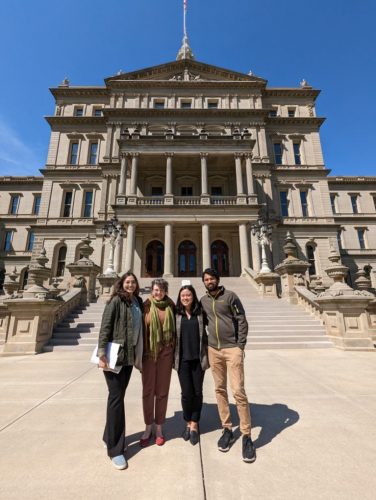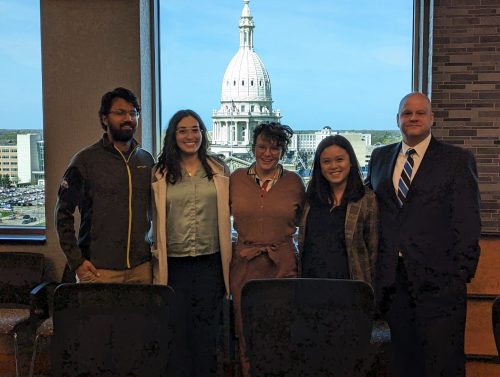Throughout medical school, we have the privilege of meeting patients with so many different life experiences. The physiology and pharmacology of medical illness is complex, but oftentimes we see that the external factors that lead to illness or injury are just as complex.
We’ve met patients with lung cancer, who have been exposed to heavy amounts of pollutants after factories were built close to their homes. We’ve seen people come into the emergency room with raging infections, who had to put off health care because they couldn’t afford the cost.
 It is an honor to be with patients in these moments and support them in ways that we can. However, sometimes it feels like there are constraints within the healthcare system — we leave these patient interactions wishing there was more we could do to change these peoples’ circumstances. This desire to drive positive change for patients beyond the one-on-one clinical setting often takes shape in the form of advocacy work.
It is an honor to be with patients in these moments and support them in ways that we can. However, sometimes it feels like there are constraints within the healthcare system — we leave these patient interactions wishing there was more we could do to change these peoples’ circumstances. This desire to drive positive change for patients beyond the one-on-one clinical setting often takes shape in the form of advocacy work.
Dr. Megan Purdy, a recent UMMS graduate, created a longitudinal course alongside U-M emergency medicine physician Dr. Brad Uren that allows students to develop skills in advocacy. In the first class, many students talked about experiences where they noticed barriers to care. People had interests about access to care for OB-GYN populations, immigrant and refugee populations, incarcerated populations, patients with substance use disorder, and more. Everyone expressed the hope to address inequities in healthcare, but felt they needed guidance about how to effectively start.
The class was a small group format, with regular guest speakers and opportunities for questions and answers with the guests after their prepared comments. Some of the pilot class’s favorite speakers are listed below.
The course kicked off with a meeting with Dr. Kermit Jones, an internal medicine physician whose experiences drove him to run for office in California’s 3rd Congressional District. He candidly shared what he learned from running a campaign, and he encouraged us to amplify the voices of our patients. He reminded us that “If you’re not at the table, you’re on the menu.”
We met former U.S. Surgeon General Dr. Jerome Adams, who spoke about his experiences in the White House and how to serve communities from a national lens. He chatted with each student individually, providing thoughts and guidance about our specific interests.
We met with Megan Groen, the senior advisor to the Director of the Michigan Department of Health & Human Services who spoke about the recent successes and the future goals of MDHHS. Students working at the U-M Student-Run Free Clinic were vocal about how insurance and food security were large concerns of patients, and Ms. Groen directed students to different resources and programs to address these issues.
Dr. Rahul Gupta, the Director of National Drug Control Policy, appointed by President Biden as the first physician to hold that role, led a discussion about the landscape of the opioid epidemic and the different policies and programs that have recently come into effect.
This class created a unique space where every week, students had the rare opportunity to have in-depth discussions with people who have worked in policy and advocacy for decades. In a welcoming and low-pressure environment, students were encouraged to bring up their hopes and concerns. In turn, experts gave students advice about how to pursue their ideas. We worked with the Michigan Medicine communications team to learn about effective ways to write an op-ed. From chatting with the manager of state and federal government relations from the Michigan State Medical Society, we learned how to advocate for our interests with our local representatives.
 At the end of the course, students had the opportunity to travel to Lansing, where they spoke with Washtenaw County’s Rep. Carrie Rheingans and Sen. Jeff Irwin. Some students interested in emergency medicine elected to travel to Washington, D.C. and attend the American College of Emergency Physician’s Leadership and Advocacy Course with Dr. Uren. In future classes, students may also travel to the American Medical Association’s National Advocacy Conference in Washington DC. Other opportunities may be available for students with other specialty interests as well.
At the end of the course, students had the opportunity to travel to Lansing, where they spoke with Washtenaw County’s Rep. Carrie Rheingans and Sen. Jeff Irwin. Some students interested in emergency medicine elected to travel to Washington, D.C. and attend the American College of Emergency Physician’s Leadership and Advocacy Course with Dr. Uren. In future classes, students may also travel to the American Medical Association’s National Advocacy Conference in Washington DC. Other opportunities may be available for students with other specialty interests as well.
This class provided networking opportunities, taught us tangible skills and instilled hope that we can leverage our perspective as medical students to advocate for our patients’ well-being. We are excited to continue this course and invite students to join this upcoming Fall and Winter!
Don’t miss the next Dose of Reality.
Alexandra Vita is a fourth-year medical student at the University of Michigan Medical School interested in public health and advocacy for immigrant populations. She will be applying into internal medicine this year.
CJ Schellack is a fourth-year medical student at the University of Michigan Medical School. She recently took a year off to get a Master in Public Health. She is applying into emergency medicine.
